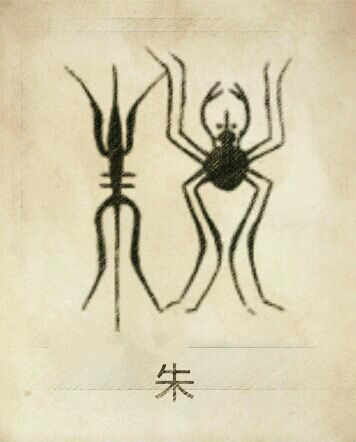Origins of the Zhu(zhū) Surname: A Tapestry of Ancient Roots

Ⅰ、The Zhu(zhū) surname, one of China’s oldest family names, boasts a rich, multicultural lineage spanning over 3,000 years. Key origins include:
1. From the State of Zhu to the Zhu Clan
The primary origin traces to Zhuanxu, a legendary emperor and descendant of the Yellow Emperor. During the Western Zhou Dynasty (1046–771 BCE), Cao Xie, a descendant of Zhuanxu, was enfeoffed in Zhu State (modern-day Zoucheng, Shandong). After the state’s annexation by Chu in 281 BCE, adopting Zhu as their surname1.
2. Multicultural Contributions
Indigenous Tribes: The prehistoric Zhuxiang Clan, associated with the Vermilion Bird (a sacred symbol of fire and renewal), and descendants of Zhu Hu, a minister under Emperor Shun, added early branches to the Zhu lineage.
Ethnic Integration: During the Northern Wei (386–534 CE) and Yuan-Ming periods (1271–1644), groups like the Xianbei’s Kezhuhun and Manchu’s Ussuri adopted Zhu as part of cultural assimilation policies1.
Ⅱ、Historical Figures: Pillars of Chinese Civilization
1.Political Leaders
Zhu Yuanzhang (1328–1398): Founding emperor of the Ming Dynasty (1368–1644), renowned for restoring Han Chinese governance and establishing administrative reforms1.
Zhu Di (1360–1424): The Yongle Emperor, who commissioned the Yongle Encyclopedia and relocated China’s capital to Beijing.
2.Philosophy & Academia
Zhu Xi (1130–1200): A Neo-Confucian philosopher whose interpretations of Confucian classics became the basis for imperial examinations until 19051.
3.Arts & Innovation
Zhu Da (1626–1705): The painter “Bada Shanren,” celebrated for his ink-wash masterpieces blending Zen Buddhism with abstract expressionism.
Zhu Zaiyu (1536–1611): A polymath who pioneered the 12-Tone Equal Temperament system, revolutionizing global music theory1.
Ⅲ、Cultural Significance: Symbols and Traditions
The Vermilion Legacy
The surname Zhu (zhū) means “vermilion,” symbolizing vitality and prosperity in Chinese culture. This color, linked to the Vermilion Bird (a celestial guardian in mythology), reflects the clan’s historical reverence for renewal and resilience1.
Ⅳ、Family Identity
1.Ancestral Halls: Zhu clans preserved identity through Junwang (regional lineages) and Tanghao (ancestral hall names), such as Bailu Tang (White Deer Hall), tied to Zhu Xi’s educational legacy.
2.Rituals: Red lanterns and scrolls in Zhu ceremonies honor ancestors while embodying cultural continuity1.
3.Political Influence:
The Ming Dynasty, ruled by the Zhu family for 276 years, shaped East Asian geopolitics through innovations like the Grand Canal and maritime expeditions1.
4.Migration & Diaspora:
During the Ming-Qing era, Zhu descendants migrated to Southeast Asia, Taiwan, and later Europe/Americas, forming vibrant overseas communities.
5.Modern Achievements:
Zhu De (1886–1976): Co-founder of the People’s Liberation Army.
Steven Chu (b. 1948): Nobel laureate in Physics and former U.S. Secretary of Energy.
Zhu Ting (b. 1994): Volleyball MVP and global sports icon1.